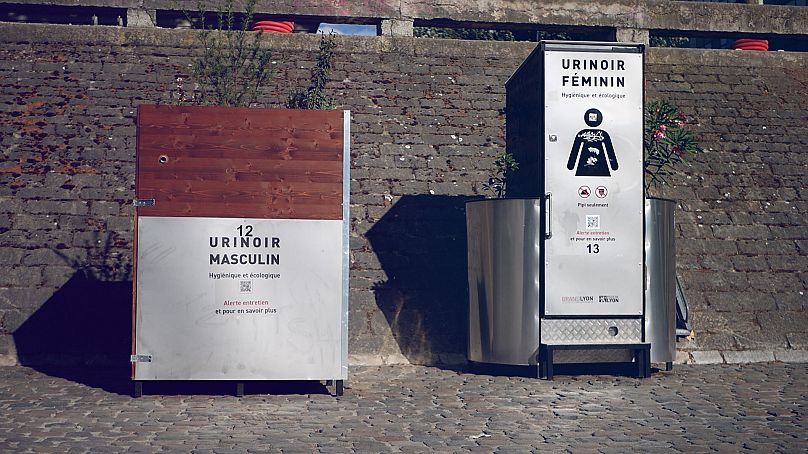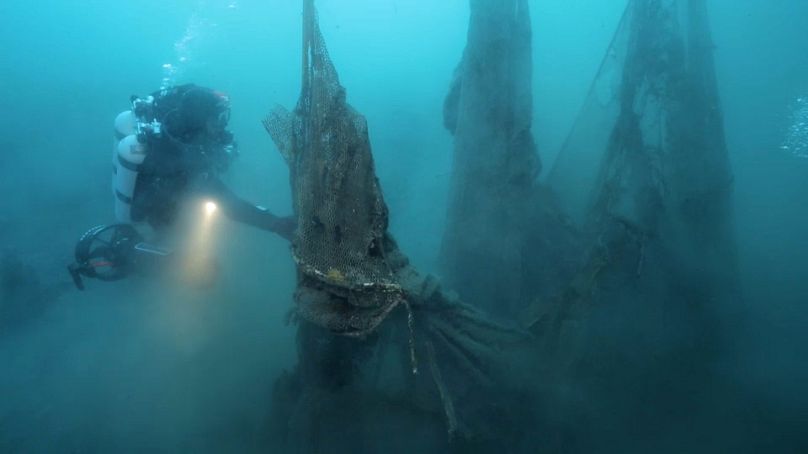TikTok is teaching Gen Zs all kinds of new skills, public generosity has rescued a doomed tea room and three other uplifting stories. These are the #GoodNews of the week.
Welcome to the good news round-up, your weekly digest of what’s going well around the globe. We hope it will give you a hit of positivity and send you off to the weekend with a smile.
These are this week’s five positive news stories
- The eco-toilets turning urine into fertiliser in Lyon, the home of Euronews.
- Public generosity has saved a tea room from closure in Kent, England
- Gen Z finds new uses for social media, including learning how to clean.
- Volunteer divers rid a Greek island of its marine ghost farms, which are deadly for marine life.
- A rare leopard was spotted in Turkey after years of searching.
Watch the video above for more on each story, or read on below.
1. The eco-toilets turning urine into fertiliser
The city of Lyon (the home of Euronews) is testing a network of 16 revolutionary toilets that will recycle urine for use in agriculture.
The toilets also provide much-needed relief in the areas that need it most, with a practical solution aimed at women.
Lyon’s eco-toilets are also dry toilets, they do not use water. This means they can be installed in places where it previously wasn’t possible.
There are seven male urinals, seven female urinals and two accessible to people with reduced mobility.
The women’s urinals have been specially designed and adapted to the female anatomy, with no need to touch the toilet bowl. The project also takes into account security issues so that women feel safe when using them, and the lavatories are deliberately installed in places where there are people around. “That is to say, exposed without being too exposed, and visible to passers-by,” Mohamed Chihi, Lyon’s deputy mayor in charge of security, safety and public peace, told Euronews.
The deputy mayor says that if they, as public policymakers, have an approach in which they install facilities thinking primarily of the male user, they are “contributing to making public space more masculine,” which is a problem, and disrespectful towards the community.
As a result, they’ve come up with an approach “to make public spaces less aggressive, less macho, quite simply. All of this contributes to the peacefulness of these areas, contributes to the tranquillity, contributes to security and safety,” he says.
Another great aspect of the eco-toilets is the environmental aspect – not only do they save on water, but they store the urine to be adapted as fertiliser. Urine is rich in nutrients such as phosphorus and nitrogen (a resource that is being depleted on the planet and is essential for agriculture).
Mr Chihi says they have already saved 158,000 litres of water. “We have had 126,000 uses recorded in less than three months and collected almost 35,000 litres of urine.”
Incredible right? Watch the video above to get a sight of Lyon’s eco-toilets (which are decorated with plants) and the city of Lyon (we went out of the studio!)
2. Public generosity saves a tea room from closure
A sleepy seaside town in Kent, England, became the unlikely focus of international generosity last month after a tea room owner’s tragic plight hit the headlines.
Steve Jackson was sleeping on the basement floor of the Jacksonwood Vintage Tea Room because he couldn't afford the petrol to drive home, the BBC reported.
He also said he was planning on closing the coffee shop he opened four years ago because he could no longer afford to pay the bills. “It'll be so devastating to lose this shop,” he said, tearfully.
But what he didn't expect was that he would be flooded with donations and offers to help out, and his life to take an unexpected turn, after his story was featured on the BBC website.
“After Thursday night when it was shown on the main news in the UK, it just went mad,” he told Euronews.
Volunteers showed up offering to work for him for free, a coffee company from Wales donated coffee beans, and he received thousands of pounds in donations from all over the country and beyond. A student even set up a GoFundMe page for him.
“It was just so overwhelming, the generosity, not from just the UK, from around the world. A man ringing up from Australia. I couldn't believe that he was watching me in Australia. Then people from Turkey, a lady from Paraguay.”
Mr Jackson says his coffee shop is thriving as never before, and he has had to turn customers away.
“I'm bouncing along, happy all the time,” he said, adding that now he can finally go back to sleep in his bed. “I didn't go home in my car because I was saving £200 every month in petrol on the fuel. But now I can go. I'm sleeping in my lovely comfortable bed.”
Mr Jackson told Euronews he has also shared some of the money he has received with other shops that are struggling. “Not a lot, I haven't given a lot because I didn't get that much. But what I can give, I give.”
“Never in my life have I experienced this overwhelming support, for a little teashop, for me, let alone me, but my little teashop. It's just so incredible,” he says, “you don't realise until it happens to you the generosity of the public.”
Mr Jackson says that some of the news is demoralising, but that when you see this sort of thing firsthand you realise how “it's not all doom and gloom.”
A few weeks back we reported on one of the main findings of the World Happiness Report, which said one of the key discoveries from this year was that the pandemic has brought an increase in social support and benevolence. Basically, it has made us nicer.
3. Gen Z finds new uses for social media
If you thought TikTok was all dance crazes and celebrity gossip, think again.
New research shows that Gen Zs are turning to social media to learn new hobbies – such as origami, roller-skating, tie-dying and pet portraits.
For the survey, carried out by Samsung for the launch of a new smartphone, 1,500 people aged between 18 and 25 were asked about their use of TikTok, Instagram and YouTube, with some surprising results.
Three-quarters of those surveyed said they had been inspired to take up a new hobby as a direct result of watching clips on social media networks. More than half of those said they spent four hours a week or more learning more about these pursuits on their smartphones.
The most inspirational videos were found to be on extreme make-up, which is less about mascara and blusher and more about creating art for the face; meditation; digital illustration, and – believe it or not – cleaning.
The youth of today is suddenly fascinated by mopping, vacuuming and laundry, inspired by a new breed of what are called ‘cleanfluencers’.
The participants were asked which social media platforms were best for finding new hobbies, and TikTok came out on top, followed by Instagram and YouTube.
4. Volunteer divers rid a Greek island of its marine ghost farms
The Greek island of Ithaca is famous throughout the world thanks to Homer’s epic, The Odyssey.
It’s currently in the news, however, for the eerie ‘ghost farms’ sitting in its clear waters.
Ghost farms are created when discarded fishing nets and equipment are left in the sea, a problem compounded for Ithaca because of two fish farms that were abandoned a decade ago.
It was the local NGO Healthy Seas that named the sinister phenomenon and says it poses a threat to marine life.
Local residents took the issue online and Healthy Seas, along with another NGO, Ghost Diving, decided to help, together with a dozen volunteer divers from the Netherlands, the United Kingdom, Greece, Lebanon and Hungary.
Pascal Van Erp, founder of the NGO Ghost Diving says the challenges of the project are the weight and the amount of the fishing nets.
“They are very very big. We have to drag them from 20 to 35 metres. The lifting itself is not dangerous, but it’s a lot of teamwork because the nets are so huge. You really have to be careful so that it does not break and come down again," he told Euronews.
The nets hauled out of the sea by the divers are then stored in containers at Ithaca before being sent away for recycling.
The divers have made a real difference. Last year, they removed 76 tonnes of marine litter from the sea and coastline. In addition to their ongoing cleaning work, their goal this year is to train fishermen, locals and visitors to help reduce the catastrophic pollution of the seabed.
5. A rare leopard spotted in Turkey
An Anatolian leopard has been captured on camera in Turkey’s eastern province.
The leopard, which sits on the red list of globally endangered species published by the International Union for Conservation of Nature (IUCN), had not been seen for years.
But this one was finally spotted in Eastern Anatolia, creating a buzz among wildlife experts, who say it is great news for the animal kingdom.
Now off to the weekend, and remember, it can be hard to find among the headlines, but some news is good news.
And if you're still hungry for more positive news, there's more above.














